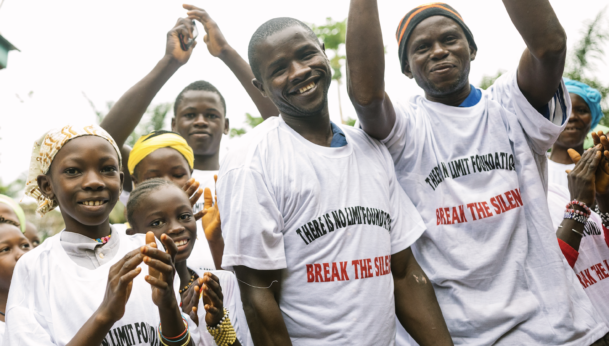#BREAKTHESILENCE x #MenEndFGM – The importance of including men and boys in the movement to end FGM worldwide
02.06.2023 Patricia Mars

The movement to end female genital mutilation (FGM) worldwide is an important step towards achieving gender equality and protecting the rights of women and girls. However, for this movement to be truly effective, it is crucial that men and boys are included in the conversation and encouraged to take an active role in ending this practice.
In 2016, There Is No Limit Foundations launched its BREAK THE SILENCE Campaign, a campaign that mobilizes people worldwide to speak up and take action to end harmful practices. We chose to focus on FGM because it is one of the greatest threats to the health, wellbeing, and economic prosperity of women and girls worldwide. Through this campaign, we work closely with men, boys and young people and as a result, we’ve trained over 10,000 community members in The Republic of Guinea on the dangers of this practice and our campaign has reached over 10 million people worldwide.
The inclusion of men and boys in the movement to end FGM is important for several reasons. Firstly, men and boys often hold positions of power and influence in the communities where FGM is practiced. They can use their influence to advocate against the practice and to educate others about the harm it causes. Men and boys can also play a vital role in challenging harmful stereotypes and attitudes that contribute to the perpetuation of FGM.
Secondly, men and boys are often the fathers, brothers, and sons of the girls and women who are affected by FGM. They have a personal stake in ending the practice and can play an important role in protecting the girls and women in their lives. By educating themselves about FGM and speaking out against it, men and boys can help to create a safer and more equal society for everyone.
Additionally, men and boys also have a role in changing the culture of silence that surrounds this issue. By including men and boys in the conversation, we can break the taboo around FGM and create a culture where it’s openly discussed and where it’s not seen as a women’s issue only.
Lastly, men and boys also have a role in changing the narrative of FGM from a practice that is seen as traditional to one that is seen as harmful and ultimately harmful to both genders. This helps in creating a culture where FGM is not seen as something that is essential to one’s culture or identity but rather as something that needs to be eradicated.
Join our campaign and donate to us today!